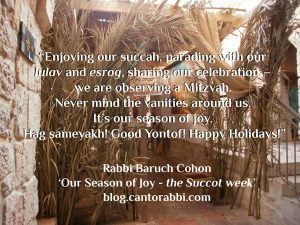OUR SEASON OF JOY – the Succot week – by Rabbi Baruch Cohon
As if we didn’t read enough contrasting Torah passages on the High Holidays, now comes Succot with daily readings, many of them detailing our complex calendar and its many different observances. We learn that this week we should “dwell in the Succah” to remind us that our ancestors used these humble huts for shelter on their way from Egypt to the Promised Land. And if your succah is big enough and you’re somewhat adventurous, you bring in a couch and sleep there. In fact, one Torah commandment states that every Israelite native – kol ezrakh b’Yisroel – shall dwell in the succah.
But of all the varied readings of this week, it is not until next week on Shmini Atzeres, the separate holiday at the end of the Succah week, that we learn a basic theme of this festival. V’samakhta b’khagekha – Rejoice in your holiday, says the Torah, for you have harvested your crops and can revel in the bounty that Nature and some hard work can provide. Share the holiday with those around you including the widow, the orphan and the resident alien. V’hayeeta akh sameyakh – “and just be happy!” A rhythmic Hebrew folk song dramatizes those two thematic quotes. In fact, when we make Kiddush, sanctifying our festive days, we identify each holiday. Passover is z’man kheyruteynu – the time of our freedom, the anniversary of our liberation from Egyptian slavey. Shavuot is z’man matan torateynu – the time of receiving our Torah, the event that made us an eternal nation. Vital historic occasions, both of them. Succot is called simply z’man simkhateynu – the time of our joy.
So as we join in blessing the Mitzvah of Succah – in our back yard or at the Synagogue, at a friend’s home or wherever we find it – and as we join in blessing the lulav v’esrog – the 4 species of new crops that we wave as we march around the Shul in our celebration, we give thanks for the bounties of Nature. And we rejoice that G-d has permitted us to see another season.
Given this positive light-hearted festive atmosphere, we may well wonder about another traditional reading associated with Succot. On the Sabbath during the Succot week, we read Kohelet, the Biblical Book of Ecclesiastes. Rember that? “Vanity of vanities… etc.” Why?
Tradition tells us that King Solomon wrote three of the Biblical books contained in the third section of the Hebrew Bible called K’tuvim – Writings. They are Song of Songs, Proverbs, and Ecclesiastes. We are told that he wrote Song of Songs as a young man, Proverbs in middle age, and Ecclesiastes when he got old. Comparing their subjects and their attitudes, that tradition certainly makes sense. Song of Songs is love poetry as only young lovers can express it. Proverbs reads like the voice of experience. Then comes Ecclesiastes. Facing an inevitable end, Kohelet describes one human activity after another, and concludes that each one is hevel – “vanity” – basically worthless. Along the way, of course, the royal writer recommends that we should “eat, drink and be merry,” having already established that tomorrow we might not be here. But he never gives up, and neither should we. His next-to-last sentence, traditionally repeated at the end of reading the book, expresses his real message: “The end of the matter, after all is heard, is to revere G-d and keep His commandments, for that completes humanity.” One of those commandments, the one we observe now, is “Rejoice in your festival….and just be happy!”
Enjoying our succah, parading with our lulav and esrog, sharing our celebration – we are observing a Mitzvah. Never mind the vanities around us. It’s our season of joy. Hag sameyakh! Good Yontof! Happy Holidays!



